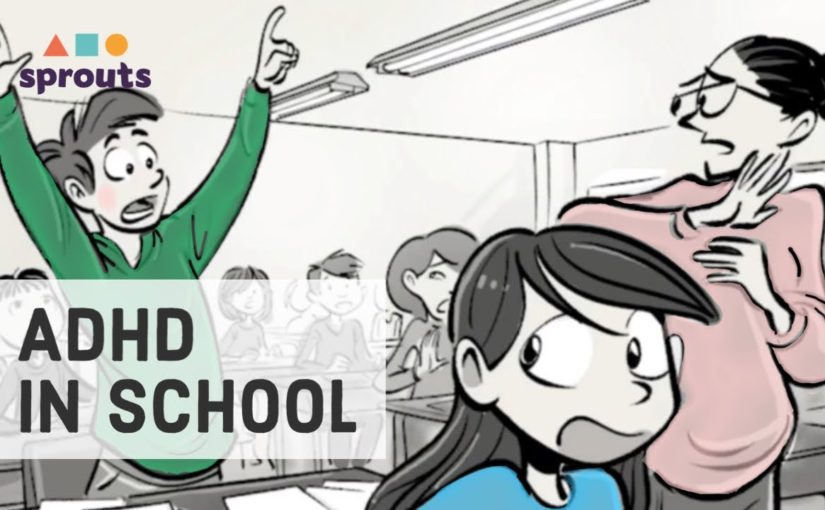ADHD stands for attention deficit
hyperactivity disorder and is often described as a mental disorder. children
with ADHD have trouble paying attention are hyperactive and often have
difficulty controlling their behavior. it is estimated that it affects around five
percent of all children aged 3 to 17 globally and that for every girl around
three boys are diagnosed with it. to understand how it affects children in
school let’s look at the story of Leo, a 12-year-old boy who goes to school with
the best intentions but struggles hard to succeed. attention deficit is his biggest problem.
Leo gets distracted so easily it happens even when he tries his hardest to focus.
he often realizes that he has suddenly zoned out and has spent the last 15
minutes thinking about something entirely different. just the tiniest
thing can get him off track. to him it feels like his brain is broken.
he is also forgetful books and homework are often left at home and if he doesn’t
miss an assignment he often loses it somewhere or forgets to turn it in. His
grades are terrible and some teachers are beginning to think that he is a lost
case. then there is his hyperactivity: when
they have to do group work he is restless and has trouble staying focused.
staying calm and listening while others speak can completely drain him, making
any normal conversation a serious challenge. to him it feels like there is
no capacity left in his brain to deal with all the input that needs to be
processed. he then feels angry about not being able
to follow along. to help cope with his hyperactivity he likes to keep his hands
busy all the time. last, there is his impulsive behavior: he
often cannot refrain from saying things that come to his mind. sometimes he tries
hard to control himself but then just blurts out and interrupts others. his
classmates find this annoying. he leader regrets his hot-headed behavior but he
knows that unfortunately, he will do it again and again. it seems to him that he
can’t learn from his mistakes. teachers get frustrated trying to get
him to behave.

Others become impatient, give up or distance themselves. after he
is diagnosed and receives support through concrete steps, things begin to
get better: at school, he is seated next to a supportive student in the front row
of the class, he gets a notebook that lists all his assignments to help him
remember and to make homework easier to track he receives it for all subjects
only once a week. to relax he is allowed to use fidget objects during lessons and
take short breaks when needed. after school he practices speaking and
listening routines with the specialist. additionally, his dad bikes with him to
school every morning and in the afternoon he is allowed to play the ball
as long as he wishes. for severe cases of ADHD prescription drugs are often
prescribed. before that happens children like Leo need to undergo a
professional age-appropriate diagnosis by a child psychologist who will try to
look below the surface. ADHD could just be the tip of the
iceberg the root cause might be drama at home, bullying at school, poor sleep or
the wrong diet. Sir Ken Robinson told the story of Gillian Lynne, an 8-year-old
girl that was said to have a learning disorder. she could not concentrate and
never sat still. when she was brought to the specialist who didn’t subscribe any
therapy but instead played music on the radio, the girl started dancing. he then
told her mother: “Gillian isn’t sick, she’s a dancer. take her to a dance school!”
Gillian Lynne later became a famous dancer and then responsible for some of
the most successful musicals in Broadway history. please share your thoughts in
the comments below. if you are hyperactive or if you are diagnosed with
ADHD please tell us about your coping mechanisms so we can learn more about it
from reading your insights. if you want to support our Channel, enabling us
to make more such videos, visit patreon.com/sprouts and check out
what we do.
As found on YouTubeBrain Booster | Blue Heron Health News ⇝ I was losing my memory, focus – and mind! And then… I got it all back again. Case study: Brian Thompson There’s nothing more terrifying than watching your own brain health fail. You can feel it… but you can’t stop it. Over and over I asked myself, where is this going to end? What am I going to end up like? And nobody could tell me. Doesn’t matter now. I’m over it. Completely well. This is how I did it!






 Others become impatient, give up or distance themselves. after he
is diagnosed and receives support through concrete steps, things begin to
get better: at school, he is seated next to a supportive student in the front row
of the class, he gets a notebook that lists all his assignments to help him
remember and to make homework easier to track he receives it for all subjects
only once a week. to relax he is allowed to use fidget objects during lessons and
take short breaks when needed. after school he practices speaking and
listening routines with the specialist. additionally, his dad bikes with him to
school every morning and in the afternoon he is allowed to play the ball
as long as he wishes. for severe cases of ADHD prescription drugs are often
prescribed. before that happens children like Leo need to undergo a
professional age-appropriate diagnosis by a child psychologist who will try to
look below the surface. ADHD could just be the tip of the
iceberg the root cause might be drama at home, bullying at school, poor sleep or
the wrong diet. Sir Ken Robinson told the story of Gillian Lynne, an 8-year-old
girl that was said to have a learning disorder. she could not concentrate and
never sat still. when she was brought to the specialist who didn’t subscribe any
therapy but instead played music on the radio, the girl started dancing. he then
told her mother: “Gillian isn’t sick, she’s a dancer. take her to a dance school!”
Gillian Lynne later became a famous dancer and then responsible for some of
the most successful musicals in Broadway history. please share your thoughts in
the comments below. if you are hyperactive or if you are diagnosed with
ADHD please tell us about your coping mechanisms so we can learn more about it
from reading your insights. if you want to support our Channel, enabling us
to make more such videos, visit patreon.com/sprouts and check out
what we do.
Others become impatient, give up or distance themselves. after he
is diagnosed and receives support through concrete steps, things begin to
get better: at school, he is seated next to a supportive student in the front row
of the class, he gets a notebook that lists all his assignments to help him
remember and to make homework easier to track he receives it for all subjects
only once a week. to relax he is allowed to use fidget objects during lessons and
take short breaks when needed. after school he practices speaking and
listening routines with the specialist. additionally, his dad bikes with him to
school every morning and in the afternoon he is allowed to play the ball
as long as he wishes. for severe cases of ADHD prescription drugs are often
prescribed. before that happens children like Leo need to undergo a
professional age-appropriate diagnosis by a child psychologist who will try to
look below the surface. ADHD could just be the tip of the
iceberg the root cause might be drama at home, bullying at school, poor sleep or
the wrong diet. Sir Ken Robinson told the story of Gillian Lynne, an 8-year-old
girl that was said to have a learning disorder. she could not concentrate and
never sat still. when she was brought to the specialist who didn’t subscribe any
therapy but instead played music on the radio, the girl started dancing. he then
told her mother: “Gillian isn’t sick, she’s a dancer. take her to a dance school!”
Gillian Lynne later became a famous dancer and then responsible for some of
the most successful musicals in Broadway history. please share your thoughts in
the comments below. if you are hyperactive or if you are diagnosed with
ADHD please tell us about your coping mechanisms so we can learn more about it
from reading your insights. if you want to support our Channel, enabling us
to make more such videos, visit patreon.com/sprouts and check out
what we do.